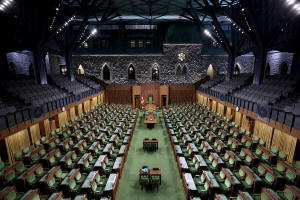|
Former speaker Anthony Rota, a member of the governing Liberal
party, resigned last week. He took full responsibility for
inviting Yaroslav Hunka, 98, a Polish-born Ukrainian who served
in one of Adolf Hitler's Waffen SS units during World War Two,
to the House when Zelenskiy spoke on Sept. 22.
Without knowing Hunka's full background, Rota publicly
recognized him as a veteran soldier for Ukraine and a hero who
had emigrated to Canada, prompting Prime Minister Justin Trudeau
to formally apologize for the gaffe last week.
The voting will kick off at 10 a.m. ET (1400 GMT), when each of
the at least eight candidates will be allowed to make a brief
speech. The members of the 338-seat House will then vote by
secret ballot, ranking the candidates in order of preference.
The House speaker is meant to be an impartial arbitrator of
parliamentary procedure, seeking to maintain order and decorum
during debates. The speaker votes only to break a tie, and plays
a ceremonial role as an institutional representative of
parliament.
Among the candidates are Liberal Greg Fergus, who if elected
would be the first person of color to become speaker. Liberal
Sean Casey would be the first speaker from Prince Edward Island.
While the Liberals have the most seats, they do not hold an
outright majority, so Conservative Chris d'Entremont, who has
been serving as deputy minister, and Green Party leader
Elizabeth May could also be elected.
The role of speaker comes with a salary boost of almost C$93,000
($68,000) per year, added to the C$194,600 base salary for a
lawmaker, and an official country estate in Quebec's Gatineau
Hills.
($1 = 1.3665 Canadian dollars)
(Reporting by Steve Scherer; editing by Deepa Babington)
[© 2023 Thomson Reuters. All rights
reserved.] Copyright 2022 Reuters. All rights reserved. This material may not be published,
broadcast, rewritten or redistributed.
Thompson Reuters is solely responsible for this content.

|
|




